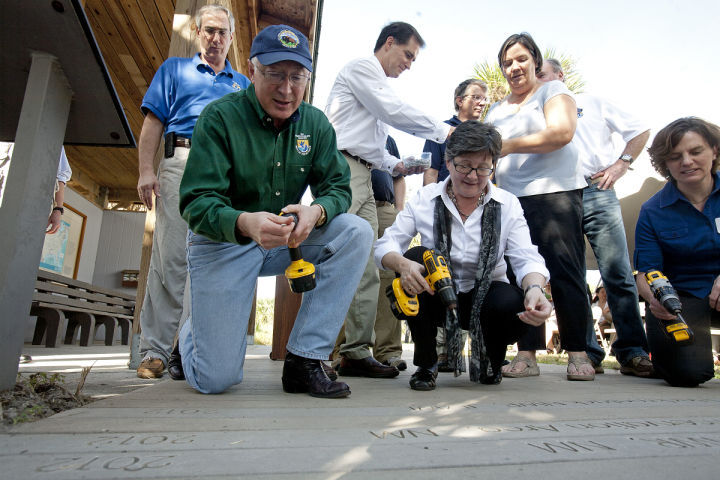
SEBASTIAN — Just as plans to develop a visitors’ center to tell the story of the Pelican Island National Wildlife Refuge were beginning to re-gather momentum, federal budget cutbacks could mean rough waters ahead.
Still, supporters are determined to move forward.
During a public meeting of the Pelican Island Preservation Society at the North County Library, Refuge Manager and Project Leader Charlie Pelizza presented an overview of the recent changes the refuge has undergone and what will be needed to keep the Visitors’ Center project on track and the Refuge Complex as a whole healthy.
The National Wildlife Refuge System received an 8.2 percent cut in its budget for the 2013 fiscal year, and is expecting similar cuts over the next few years.
At most of the 561 refuges, funding cuts have caused staff shortages, resulting in delays in maintenance and project progress, Pelizza explained, noting that, although the Pelican Island Complex staffing has increased over the past five years, it has not kept pace with the needs generated by the increase in refuges under its responsibility.
The refuge has been more fortunate than some, however, because it shares a 10-person staff among its four components, the Pelican Island NWR, the Archie Carr NWR, the Lake Wales Ridge NWR and one of the newest refuges in the country – the Everglades Headwaters NWR.
“We’re all in one building, with shared responsibilities,” Refuge Manager Kevin Lowry said.
Encompassing 5,400 acres, the Pelican Island refuge is far more than the original island many people envision.
Its waters and wetlands form a complex ecological system supporting hundreds of species of birds, fish, plants, and mammals.
A visitors’ center has been a dream of Pelican Island Preserve supporters since the appointment of Refuge Manager Paul Tritiak in the early 1990s after more than 60 years without one.
The preserve’s centennial celebration in 2003 also sparked renewed interest. At that time, the focus was to attempt to acquire the Kroegel homestead for this purpose. (It is still owned and occupied by descendants of Paul Kroegel, the refuge’s first manager.)
Today, the hope is to work with the Sebastian River Area Chamber of Commerce and the City of Sebastian to locate the visitor’s center in Sebastian, home to Pelican Island and Kroegel, where it will be easily accessible to the public, and provide the history, education, and context for both Pelican Island and the National Refuge System.
Although Pelican Island was the first national refuge, said Lowry, it remains one of the few that has never had a visitors’ center or any way “to tell the story of the nation’s first refuge and to showcase Pelican Island and Sebastian as the birthplace of a vital part of the US Fish and Wildlife Service.”
The hope is to locate the visitors center along Indian River Drive, at Fisherman’s Landing, “the heart and soul” of Sebastian. The heavy amount of “people traffic” in that area would make it a prime location to showcase such a significant part of Sebastian’s culture and heritage and a complement to the Working Waterfront Project.
“We hope it would be nothing more than a land swap,” Lowry stated.
Plans at this point, said Pelizza, are “very preliminary”, but obviously such a project will require a significant amount of funding, which, at this moment in time, may be hard to come by from the federal government.
If it is to become a reality, he said, it will be necessary for refuge supporters to step up and help raise money.
In addition to the Pelican Island Preservation Society, said Lowry, other support groups who can raise money and seek grants for the project are the Pelican Island Audubon Society and the Cultural Council of Indian River County, all non-profit organizations.
“Vital to the project’s success,” he stressed “is the power of partnerships.”
Also very instrumental in moving the project forward is the Sebastian River Area Chamber of Commerce.
“Beth has been fantastic,” says Lowry.
Beth Mitchell, the chamber executive director, said she’s ecstatic about a center.
“There is a real need to connect Pelican Island to the community that is its home.”
She agreed the project has been a dream of many supporters for years, and noted the eye-catching display in the chamber offices at US 1 and Main Street, which replicates the Pelican Island Rookery and beautifully displays some of the wildlife that call it home.
“The Pelican Island Preservation Society,” Pelizza concluded, “is hoping for great support from the public, in its effort to assist the refuge with this major project and to tell the story of Pelican Island, and the founding of this country’s premier system for wildlife conservation.”
For more information about how to get involved, visit the PIPS website at www.firstrefuge.org, or call 772-202-0697.



